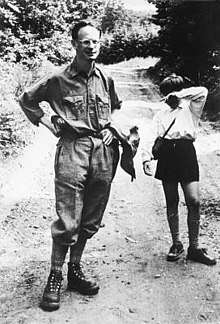
Every mathematician worthy of the name has experienced the state of lucid exaltation in which one thought succeeds another as if miraculously. This feeling may last for hours at a time, even for days.
André Weil (6 May 1906 – 6 August 1998) was one of the greatest mathematicians of the 20th century, whether measured by his research work, its influence on future work, exposition or breadth. He is known for his foundational work in number theory and algebraic geometry. He was a founding member, and de facto the early leader, of the influential Bourbaki group. The philosopher Simone Weil was his sister.
Quotes
- God exists since mathematics is consistent, and the Devil exists since we cannot prove it.
- As quoted in Mathematical Circles Adieu (Boston 1977) by H Eves
- Every mathematician worthy of the name has experienced the state of lucid exaltation in which one thought succeeds another as if miraculously. This feeling may last for hours at a time, even for days. Once you have experienced it, you are eager to repeat it but unable to do it at will, unless perhaps by dogged work.
- The Apprenticeship of a Mathematician (1992)
- First rate mathematicians choose first rate people, but second rate mathematicians choose third rate people.
- As quoted in Comic Sections (Dublin 1993) by D MacHale
- An important point is that the p-adic field, or respectively the real or complex field, corresponding to a prime ideal, plays exactly the role, in arithmetic, that the field of power series in the neighborhood of a point plays in the theory of functions: that is why one calls it a local field.
- as translated by Martin H. Krieger "A 1940 letter of André Weil on analogy in mathematics." Notices of the AMS 52, no. 3 (2005) pp. 334–341, quote on p. 340
- It is hard for you to appreciate that modern mathematics has become so extensive and so complex that it is essential, if mathematics is to stay as a whole and not become a pile of little bits of research, to provide a unification, which absorbs in some simple and general theories all the common substrata of the diverse branches if the science, suppressing what is not so useful and necessary, and leaving intact what is truly the specific detail of each big problem. This is the good one can achieve with axiomatics (and this is no small achievement). This is what Bourbaki is up to.
- as translated by Martin H. Krieger "A 1940 letter of André Weil on analogy in mathematics." Notices of the AMS 52, no. 3 (2005) pp. 334–341, quote on p. 341
- About ancient mathematics (whether Greek or Mesopotamian) and medieval mathematics (Western or Oriental), the would-be historian must of necessity confine himself to the description of a comparatively small number of islands accidentally emerging from an ocean of ignorance, and to tenuous conjectural reconstructions of the submerged continents which at one time must have bridged the gaps between them.
Quote About
- Sometimes my sister and I dream of having a run-of-the-mill father. He would make coffee and toss salads. He would not prefer his work to us, and he would tell us instead: "How pretty you look, my dear, tell me what you did today." He would speak to us with words of affectionate banality.
- Yes, but there is the problem. It would have been banal. Mediocre. We had been trained to despise everything which was not excellent. How disgusting to see the father of one of our classmates or friends on vacation playing cards or, even worse, siting on the sofa watching television. We blush with shame for our unfortunate little friend.
- When he was not busy doing math, he reads fat books covered with rough leather, on the pages of which can be seen very old, perfectly round holes dug out by medieval worms. Or else he passes through a museum while devoting himself to unbelievably profound notions about Van Gogh's paintings or Greek amphorae.
- For our genius of a father did not limit himself to math. His brain was an octopus, the tentacles of which extended in all directions. He could scan Latin verse and Greek verse as well, and it was as if he were hearing Homer or Theocritus in person. Not to mention the fact that he read Greek from volumes filled with characters which in no way resembled the ones in our Greek grammar or book of excerpts from Greek literature. He also read Sanskrit, with its truly bizarre letters. He spoke Italian like Dante, Spanish like Cervantes, and so for almost every living language.
- Alexandre Grothendieck was very different from Weil in the way he approached mathematics: Grothendieck was not just a mathematician who could understand the discipline and prove important results—he was a man who could create mathematics. And he did it alone.
- Amir D. Aczel (29 April 2009). The Artist and the Mathematician. Basic Books. pp. 54. ISBN 978-0-7867-3288-3.
External links
- "André Weil", at the MacTutor History of Mathematics archive
- André Weil : memorial articles in the Notices of the American Mathematical Society
- A 1940 Letter of André Weil on Analogy in Mathematics
- "Andre Weil, Who Reshaped Mathematics, Is Dead at 92" by Ford Burkhart in The New York Times (10 August 1998)
- "The lives they lived: Andre Weil; Numbers Man" by Paul Hoffman in The New York Times (3 January 1999)
- Artless innocents and ivory-tower sophisticates: Some personalities on the Indian mathematical scene by M. S. Raghunathan
- Image of Weil
This article is issued from
Wikiquote.
The text is licensed under Creative
Commons - Attribution - Sharealike.
Additional terms may apply for the media files.